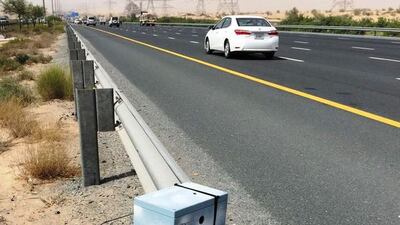ABU DHABI // Police forces across the country are increasingly turning to technology to enforce the rules of the road and hand out penalties for poor and dangerous driving.
Ten new radar systems that detect, photograph and fine drivers who overtake on or use the hard shoulder were switched on in Sharjah on Sunday.
The devices were designed by the emirate’s police.
New radars were also recently installed on Al Ittihad Road, Sheikh Mohammed bin Zayed Road and Sheikh Khalifa bin Zayed Road, with more of the devices to be introduced.
The radars will reduce the likelihood of drivers committing offences, according to Robert Hodges, chief operating officer at Emirates Driving Institute.
“Types of intelligent ‘machine vision’ cameras are pretty much cutting edge in this region and are based on recent systems in Europe and in North America,” he said. “These systems are now very reliable and can be used to monitor lane switching, use of the hard shoulder, tailgating, speeding and red-light running.”
The UAE embraced technology as part of its “smart city” initiatives, said Thomas Edelmann, founder of Road Safety UAE.
“It makes a lot of sense to count on technology to establish the feeling that our behaviour on the roads is being monitored by the authorities,” he said.
Almost every day drivers illegally use the hard shoulder to overtake, especially during peak-hour traffic, said Ali Ahmed, a 23-year-old Emirati student who lives in Sharjah.
“Drivers will now try to avoid using the hard shoulder when in a traffic jam. About four years ago a driver who overtook on the hard shoulder ended up being hit by another vehicle.”
Misusing the hard shoulder could also impede emergency services, said Col Jamal Al Ameri, head of public relations at Abu Dhabi Traffic and Patrols Directorate. “Never drive on the hard shoulder. It is meant to be used only in emergencies by ambulance, police cars and other authorised vehicles,” he said.
Offenders risk a Dh600 fine, six black points on their licences and having their vehicles impounded for a month.
Not giving way to emergency vehicles or official convoys could attract a Dh500 fine and four black points.
Despite this, 3,616 drivers were caught overtaking on the hard shoulder in the first three months of this year, Abu Dhabi traffic statistics showed.
Police were also stepping up patrols across the emirate to counter the bad driving.
The no-flash cameras at several traffic junctions across Abu Dhabi were programmed to detect overtaking on the hard shoulder, excessive speed, jumping red lights and other offences.
Last month the Abu Dhabi Monitoring and Control Centre announced the launch of the Falcon Eye – a security system that uses thousands of cameras around the city to better manage traffic flow and monitor and deter potential offenders.
Dubai police used advanced automated traffic enforcement such as Al Motabea’a (The Supervisor in Arabic) cameras that detect use of the hard shoulder and stopping in yellow-box junctions. Seventy devices would be deployed across the city, said police this month.
This year, speed cameras capable of detecting cars on hard shoulders, tailgating, red-light jumping and wrong overtaking, were also installed in the city. In May, Dubai Police ordered 20 battery operated portable devices that can detect motorists on the hard shoulder.
Al Burj radars, introduced on some roads in Dubai in 2014, were installed on Sheikh Mohammed bin Zayed Road, Sheikh Zayed Road and Emirates Road.
The tower-shaped radars can detect motorists who drive above or below speed limits as well as tailgating and hard-shoulder offences.
“High-visibility police presence combined with undercover civil patrols will round off the automated enforcement of the road rules,” Mr Edelmann said. “In this context, the element of surprise plays a key role.”
rruiz@thenational.ae
rruiz@thenational.ae

